
Francis Albert Sinatra was an American singer and actor. Nicknamed the "Chairman of the Board" and later called "Ol' Blue Eyes", he is regarded as one of the most popular entertainers of the mid-20th century. Sinatra is among the world's best-selling music artists, with an estimated 150 million record sales globally.
Traditional pop is Western pop music that generally pre-dates the advent of rock and roll in the mid-1950s. The most popular and enduring songs from this era of music are known as pop standards or American standards. The works of these songwriters and composers are usually considered part of the canon known as the "Great American Songbook". More generally, the term "standard" can be applied to any popular song that has become very widely known within mainstream culture.

Axel Stordahl was an American arranger and composer who was active from the late 1930s through the 1950s. He is perhaps best known for his work with Frank Sinatra in the 1940s at Columbia Records. With his sophisticated orchestrations, Stordahl is credited with helping to bring pop arranging into the modern age.
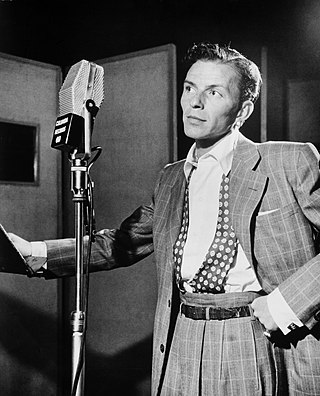
A crooner is a singer that performs with a smooth, intimate style that originated in the 1920s. The style was made possible by better microphones which picked up quieter sounds and a wider range of frequencies, allowing the singer to access a more dynamic range. This suggestion of intimacy was supposedly wildly attractive to women, especially younger ones such as teenage girls, known at the time as "bobby soxers". The crooning style developed out of singers who performed with big bands, and reached its height in the 1940s to late 1960s.

"Strangers in the Night" is a song composed by Bert Kaempfert with English lyrics by Charles Singleton and Eddie Snyder. Kaempfert originally used it under the title "Beddy Bye" as part of the instrumental score for the movie A Man Could Get Killed. The song was made famous in 1966 by Frank Sinatra.

"One for My Baby (and One More for the Road)" is a song written by Harold Arlen and Johnny Mercer for the movie musical The Sky's the Limit (1943) and first performed in the film by Fred Astaire.

"In the Wee Small Hours of the Morning" is a 1955 popular song composed by David Mann, with lyrics by Bob Hilliard. It was introduced as the title track of Frank Sinatra's 1955 album In the Wee Small Hours.

"High Hopes" is a popular song first popularized by Frank Sinatra, with music written by James Van Heusen and lyrics by Sammy Cahn. It was introduced by Sinatra and child actor Eddie Hodges in the 1959 film A Hole in the Head, was nominated for a Grammy, and won an Oscar for Best Original Song at the 32nd Academy Awards.
"The Things We Did Last Summer" is a popular song about nostalgia from 1946. The words were written by Sammy Cahn, with the composition by Jule Styne. The most well known version is the 1946 Top ten hit by Jo Stafford. Versions by Frank Sinatra and by Vaughn Monroe also charted that year. Shelley Fabares had a hit cover in 1962 on the pop chart. Several recordings have been made, including versions by Frank Sinatra, Vaughn Monroe, and Dean Martin who recorded different versions for his 1959 and 1966 Christmas LPs.
"Strike Up the Band" is a 1927 song composed by George Gershwin, with lyrics by Ira Gershwin with the collaboration of Millie Raush. It was written for the 1927 musical Strike Up the Band, where it formed part of a satire on war and militaristic music. Although the musical was not successful, the instrumental version of the song, titled the "March from Strike Up the Band", has become quite well known. The song was also used in the Judy Garland-Mickey Rooney 1940 film Strike Up the Band.
"It's All Right with Me" is a popular song written by Cole Porter, for his 1953 musical Can-Can, where it was introduced by Peter Cookson as the character Judge Aristide Forestier.
"What's New?" is a 1939 popular song composed by Bob Haggart, with lyrics by Johnny Burke. It was originally an instrumental tune titled "I'm Free" by Haggart in 1938, when Haggart was a member of Bob Crosby and His Orchestra. The tune was written with a trumpet solo, meant to showcase the talents of band-mate Billy Butterfield. Crosby's orchestra recorded "I'm Free" the same day it was written.

Gary Williams is a British jazz singer, writer, and broadcaster whose performances include concerts, cabaret shows, and theatre. Williams has recorded ten solo albums and written Cabaret Secrets, a book on stagecraft.

Alone Together is the debut album by vocalist Gary Williams. It was recorded with the John Wilson Orchestra at Abbey Road Studios and released in 2004. It is a collection of ballads and swing standards arranged by Andrew Cottee.
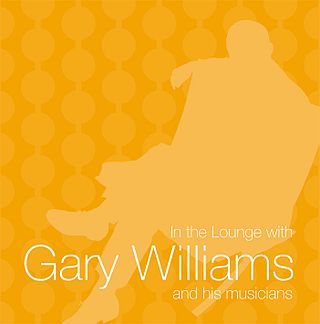
In the Lounge with Gary Williams is jazz vocalist Gary Williams's second album, recorded at Abbey Road Studios and released in 2006. It is a collection of arrangements played by jazz musicians.

The Best of Abbey Road is jazz vocalist Gary Williams's fifth album, released in 2010. It is a compilation album of songs from three albums recorded at Abbey Road Studios: Alone Together, In the Lounge with Gary Williams and Swingin' on Broadway.
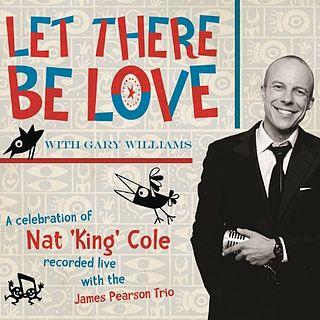
Let There Be Love is jazz vocalist Gary Williams's sixth album, recorded at the Caxton Theatre, Grimsby, on 15 May 2004, and released in 2011. It is a Nat King Cole tribute album, recorded with the musicians James Pearson, Jeremy Brown and Matthew Skelton, and arranged by Andrew Cottee. Academy Award winner Don Black provided the sleeve notes.
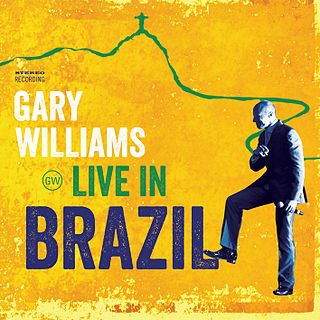
Live in Brazil is jazz vocalist Gary Williams's seventh album, recorded live onboard Royal Caribbean's ship Splendour of the Seas in 2013. It includes big band covers of songs by Gipsy Kings, Antônio Carlos and Tom Jobim, Frank Sinatra, Lady Gaga and Kylie Minogue. One song is recorded in English, German and Japanese. The live show was seen by over 20,000 Brazilians in 8 months.
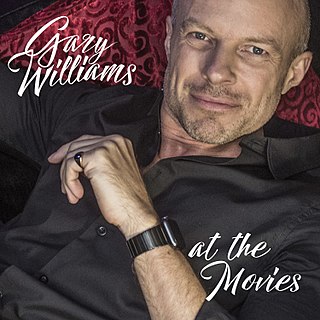
At The Movies is the ninth album from jazz vocalist Gary Williams. Recorded at Kenilworth Studios in 2017, the album was originally intended to feature only Disney songs but was later expanded to cover songs from the movies. It was recorded with full big band and a jazz combo.

Legends is the eleventh album from jazz vocalist Gary Williams. Recorded at Kenilworth Studios in 2019, it is a tribute to the stars of Las Vegas including Tom Jones, Elvis Presley and The Rat Pack. It was recorded with big band and a jazz combo.














